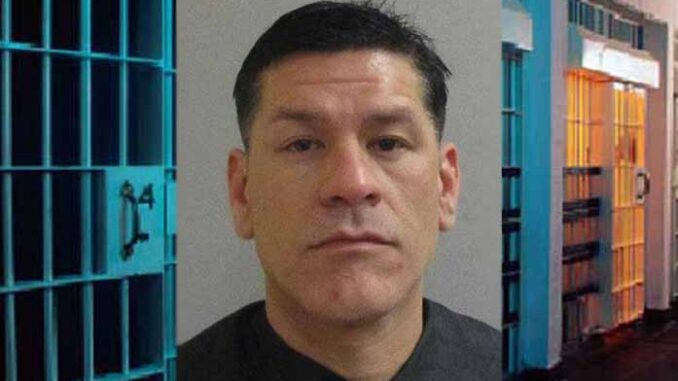
A Sierra Vista man who alleged that a local police officer lied about smelling marijuana in his car nearly three years ago will be sentenced next month after agreeing to a plea deal that does not require an admission of guilt.
Eric Oscar Del Grande signed the plea agreement Oct. 5 while nearly 75 prospective jurors waited outside the courtroom for his trial to begin. The terms of the agreement call for him to serve 30 days in jail followed by four years of probation once he is sentenced Nov. 29.
Del Grande, 44, entered a no contest plea to a Class 4 felony of possessing or using methamphetamine back in December 2018. No contest, or nolo contendere, means a defendant does not admit guilt but accepts the conviction, sentence, and any fines, fees, and loss of civil rights as if a guilty plea had been entered,
In accepting the rare no contest plea, Judge Laura Cardinal noted on the record that she had “given due consideration to the views of the parties and the interest of the public in the effective administration of justice” and found Del Grande had “knowingly, intelligently, and voluntarily” entered into the agreement.
After waiting nearly two hours, the prospective jurors were finally brought into the courtroom and advised by Cardinal that their service would not be needed after all.
The unexpected outcome in Del Grande’s case was just the latest twist in a saga which started Dec. 20, 2018, when then-Sierra Vista Officer Annalise Roselli made a traffic stop and ended up arresting Del Grande
Del Grande would not be indicted by a county grand jury for 364 days.
Defense attorney Rodrigo Andrade later filed a motion to suppress evidence found in Del Grande’s car as well as statements Del Grande made at the scene. Andrade argued Roselli had no probable cause to search the vehicle and that the officer used a taillight issue as a pretext to stop Del Grande and then claim to smell marijuana as justification to search the car.
Whether there was an odor of marijuana emanating from Del Grande’s vehicle is essential to whether Roselli lawfully searched the vehicle and whether any evidence connected to the search could be presented to the jury.
Cardinal heard conflicting testimony last month from the officer as well as Del Grande’s boss about the marijuana issue. The boss, Roger Everett, is also Del Grande’s brother-in-law. He walked to the passenger side of the car while Roselli conducted the traffic stop, and along with Del Grande claimed there was no smell of marijuana.
“(Everett) testified that he knew the odor of marijuana, whether fresh or smoked, based on his years of experience smoking marijuana and transporting marijuana – conduct which resulted in criminal prosecutions,” Cardinal noted in her ruling on the motion to suppress.
The judge relied heavily on Roselli’s body cam footage in her ruling. The video shows the officer approach the open driver’s side door and within seconds she asked if Del Grande has a medical marijuana card. Roselli is also heard saying the car “smells like weed.”
The officer proceeded to obtain Del Grande’s license, registration, and insurance. She also continues inquiring about the smell of marijuana, according to the body cam footage.
“The Defendant states that he does not smell marijuana, that he does not smoke marijuana, that there is no marijuana in the vehicle, that to his knowledge no one else has smoked marijuana in the vehicle, and that he has smoked cigarettes in the vehicle,” Cardinal notes of the several-minute exchange between Roselli and Del Grande.
The officer then orders Del Grande to exit the vehicle, and after a brief search she locates a pipe used for smoking meth. Del Grande is arrested, during which he made a self-incriminating comment about his meth use.
No marijuana was ever found in the car.
Cardinal’s ruling notes Everett and Roselli “were credible in their testimony, and that the court is unable to assess the reliability of their testimony based simply on their knowledge and experience.” She also rejected arguments that each side’s witnesses were biased, finding “neither appeared to be fabricating facts in any way during their testimony.”
What Cardinal found more persuasive was the opportunity Everett and Roselli had to smell the interior of the vehicle.
“In that regard, Officer Roselli had a superior opportunity, based on the time she spent at the open door of Defendant’s vehicle, compared to Mr. Everett’s lesser time at the vehicle, from the opposite side of the open passenger compartment,” the judge ruled.
Roselli’s claim that she detected the odor of marijuana gave her “the lawful right to search the vehicle and the contents thereof,” Cardinal wrote. “The fact that Officer Roselli’s search revealed no marijuana or marijuana paraphernalia in the vehicle is not dispositive as to whether the search of Defendant’s vehicle was lawful.”
With the search ruled legal and the evidence admissible along with Del Grande’s comments, prosecutor Terisha Driggs moved ahead with the prosecution. For his part, Del Grande rejected at least three plea offers prior to his trial date.
Cardinal will decide during the sentencing hearing whether Del Grande serves probation with standard or intensive supervision.
Although Roselli was a canine officer at the time, she did not deploy the dog during the Del Grande traffic stop. Public records show Roselli’s resignation from the Sierra Vista Police Department was effective eight days after the stop.

